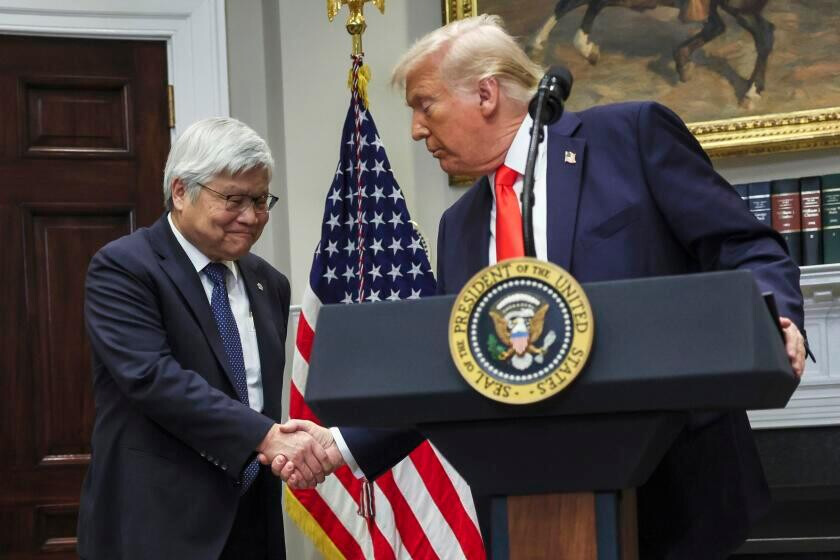
Taipei - Lai Ching-te, Taiwan's President, must have watched with bated breath as the island nation's trade and defense policies swiftly pivoted in a new direction following the inauguration of US President Donald Trump in January.
The government appears to have been deeply involved behind the scenes in Taiwanese semiconductor giant TSMC's decision to establish three production facilities in the United States. Furthermore, President Lai's administration has aggressively pursued plans to import US-made goods that are likely to capture President Trump's attention, and is also pushing for a significant increase in the defense budget.
It is as if Taiwan had conducted a thorough pre-election analysis of the new US administration and was prepared. Or perhaps, it is simply moving faster than other nations. High-ranking Taiwanese officials are meticulously analyzing President Trump's policy agenda, seeking areas that will advance Taiwan's interests while also garnering enthusiastic support from the United States.
A prime example is TSMC's announcement in early March that it would invest an additional $100 billion to build chip manufacturing plants and a research and development center in the US, as part of a total planned investment of $165 billion. This came shortly after President Trump, during his election campaign, accused Taiwan of "stealing" America's chip business and threatened to impose a 100% tariff on chips.
The announcement triggered strong reactions within Taiwan. Many Taiwanese view TSMC, which produces at least 80% of the world's most advanced chips, as a "silicon shield" for geopolitical protection, believing that TSMC's presence incentivizes foreign nations to defend Taiwan. There were significant concerns that this "silicon shield" would be weakened if President Lai appeared to be aligning with the US push to rebuild its chip industry.
However, President Lai likely understood that opposing President Trump's agenda could leave diplomatically isolated Taiwan adrift. It is highly probable that TSMC would not have made such a substantial investment announcement if President Trump had not won the US election. But this gamble appears to have paid off. On the day of the announcement, President Trump looked pleased.
Chris Miller, a semiconductor industry expert and author of "Chip War," remarked at a seminar in Taipei in late March, "The TSMC announcement looks like a remarkable success."
"TSMC has positioned itself well with a new US administration as a partner," Miller added. "This is all positive for TSMC and for US-Taiwan relations."
He also analyzed that "while the TSMC announcement does not solve all the problems, it puts the relationship on a much stronger footing."
Taiwan's chip industry is not expected to undergo significant changes in the next five years. Building factories in the US is a slow process, and many experts believe it will be extremely difficult to replicate in the US the unique industrial and cultural ecosystem that has allowed TSMC to flourish in Taiwan.
President Lai's moves are not limited to the chip industry. He had already announced plans in February to purchase natural gas from Alaska. Taiwan historically boasts one of the strongest environmental movements in Asia, and most Taiwanese have a strong awareness of environmental preservation. However, President Lai and his officials have taken note of President Trump's push to expand the oil and gas industry.
Furthermore, they recognize that President Trump views trade deficits as a threat to the US economy. President Lai and his team realistically expect that these purchases will help reduce the US's sixth-largest trade deficit with Taiwan as of 2024, while also contributing to Taiwan's energy security.
Currently, Australia, Qatar, and the United States are Taiwan's top three natural gas suppliers, with the US accounting for 10% of total imports. If the introduction of Alaskan gas materializes, Taiwan will likely prefer to reduce imports from Qatar, as it would be hesitant to strain its relationship with Australia for strategic reasons.
Moreover, President Lai has swiftly moved forward with plans to purchase US agricultural products. Taiwan's Foreign Minister announced in late March that Taiwan would dispatch an agricultural procurement delegation to the US in September. President Lai has also pledged to increase the defense budget this year to over 3% of GDP, up from the initially planned 2.45%.
Of course, President Lai's challenges are not over. The Trump administration is highly likely to be unsatisfied with this level of defense spending and may pressure Taiwan to increase it to 5% or even 8% of GDP. And on April 2nd, President Trump announced new tariff plans in the most aggressive trade move in nearly a century. This includes a 32% tariff on Taiwanese goods, excluding semiconductors, which has drawn strong protests from Taiwanese officials. Miller anticipates much more friction and intense diplomatic maneuvering between Taiwan and the US over the next four years.
However, it is noteworthy that Taiwan has not proposed any retaliatory tariffs. President Lai appears to remain focused on maintaining a positive relationship with President Trump.
These initial moves clearly demonstrate President Lai's leadership style. He and his independence-leaning Democratic Progressive Party have revealed a strong pragmatic streak. President Lai has also shown an ability to read the mind of President Trump and his supporters, anticipating what will please them.
[Copyright (c) Global Economic Times. All Rights Reserved.]



























